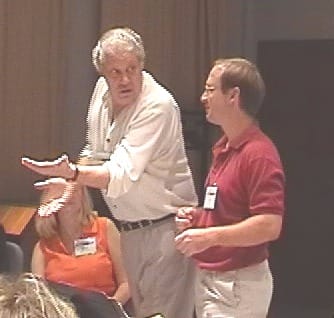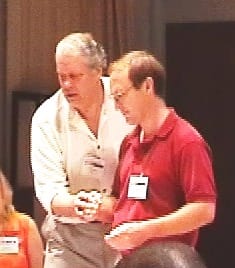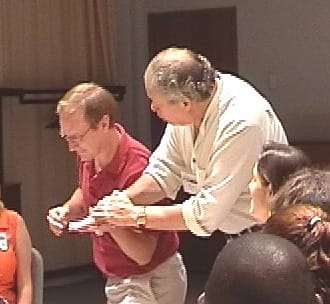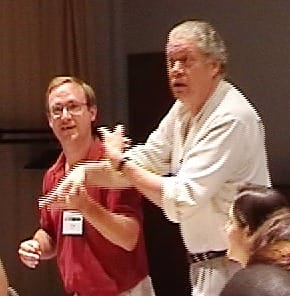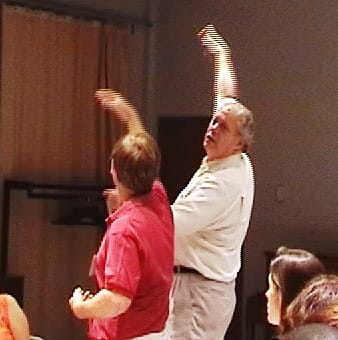Ignite Response to Your Conducting
Music Students' Wise Advice for Us
Music Students' Wise Advice for Us
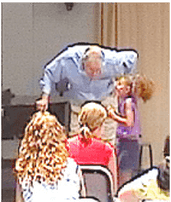
Here's verbatim advice to conductors about how to rehearse...from former students!
Doesn't it make sense to ask the young musicians what they'll respond to? How best to work with them?
Their advice is frank and insightful, and gives a detailed road map for us to follow...that can't be found anywhere else.
I've shared these comments with colleagues. When I did it in person, their response was usually a silence. But I could hear them thinking, "I had no idea..."
Doesn't it make sense to ask the young musicians what they'll respond to? How best to work with them?
Their advice is frank and insightful, and gives a detailed road map for us to follow...that can't be found anywhere else.
I've shared these comments with colleagues. When I did it in person, their response was usually a silence. But I could hear them thinking, "I had no idea..."
Qualities we Value Most in our Conductors
- "Don't settle for just good - challenge us and make it great, I never like hearing the phrase '...well that's good enough...let's move on.'"
- Patience with a firm hand: be patient if we're trying, but don't let us slack off (that drives me mad when conductors don't hold players responsible for knowing their part. It makes the group sound messy and gets on my nerves).
- I love a conductor who is clear and specific about what needs to be changed and works efficiently to make the change and move on. I value a conductor that expects each student to work hard to become their best self, and speaks to a student privately if there's an issue to address, or needs to practice more.
- Ability to engage us to our full capacity in order to create a meaningful and memorable musical experience; energetic attitude.
- Expressive: I want someone who shows me a whole range of emotions and shows me what I need to be conveying in my music. There's more to music than just dynamics.
Note from David: If we want them to be expressive, we have to be expressive
- Willingness to help us understand the music, to break down the parts, to train us to know what to listen for, to give us even things like historical context, background information, etc. We're young musicians, not walking encyclopedias.
- Helping us to listen to the other parts and be able to respond to them in such way as to create authentic, beautiful and moving music.
- Great conductors value the student as a person, expects the most from them, pushes them to learn better, inspires them to work hard, and gives them approval and appreciation when deserved."
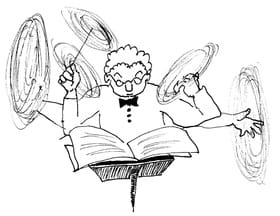
Get us to Watch you like This
- "Why should I look up from the page and risk making a mistake if all I see is my conductor looking down at the music?
- Make sure you're worth it. If you call out 'Watch me!' and we don't see anything going on, no matter how much you tell us to...we won't.
- Every time we look up and find your eyes glued to your own score it trains us not to look up--there's not going to be any connection and, consequently, no helpful musical direction.
- Once we realize how well we can play if when we actually watch, we'll try to play like that every time. Looking up feels like a huge risk with very little payoff most of the time. Remember, if you want us to look up, then don't keep your face buried in the score!"
Here's How to Correct Us
- "Be respectful and polite, yet let the orchestra know you think they are capable of doing better.
- Please don't yell at us thinking that we can automatically fix a mistake. Break it down. Ask us if we know what we did wrong. This engages us and makes us more aware of what we're doing/how we're playing. If nobody knows the answer, then tell us. Then, have us play it slowly, very slowly. When we're playing it correctly, then you can start speeding it up. But, first we need to devote it to our muscle memory.
- Never, ever - and I mean it - never, ever blame us kids when it's your fault. We like you better when you made a mistake and admit it - it makes us trust you more.
- The first time we play the passage correctly, up to tempo, have us do it again. Make sure to ask us to really pay attention to the way it feels, sounds, etc. Then, have us play the measure before and the measure after. Then start building on the measures around that particular passage. It's slow work, but it'll stick in our memory.
- With humility. Acknowledge we're all human and we all just don't get it sometimes.
- Correcting Students: Treat us with respect and like professionals. Adolescents have a lot going on internally and externally, and I believe the benefit of the doubt should always be applied before jumping to conclusions.
- Be frank, but please do not be demeaning or rude! Great music making starts with everyone getting along. I appreciate direct, meaningful corrections and then a chance to make an adjustment - and congratulate us on the fixed issue! (It's amazing how much a heartfelt 'Thank you!' can mean to a group of hard working musicians. We do really want to please our conductor!)"
Here's How to get us Quiet
- Part of getting an orchestra to be quiet is how much respect the orchestra has for you. Typically, the longer it takes for them to get quiet the less respect they have for you. With kids who respect you and want to play and learn, I think it is possibly to achieve an 'ensemble culture' of quiet.
- Whatever you do, don't let the students get bored! Sometimes explaining how important it is to you and why it's important to you to have an "ensemble culture" of quiet really works too. That way, you're allowing us to, in a way, get in your mind. We feel more connected to you because we know why and what you think about something important. Since it's important to you, it's important to us!
- Gaining your students' respect so all that is required for silence is a simple wave of baton.
- Here's another way to quiet them down: bring chatty students up to the podium, sit where they sat and, well, behave like them:
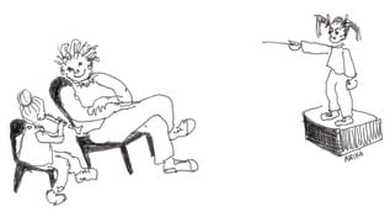
- Young musicians often aren't aware of how strongly their behavior affects others.
- But when they see from the podium exactly how they look...the change can be miraculous - and you usually don't have to say a word! Just nod at them: 'Do you see what I mean?' and they'll usually nod back.
- It's best to invite a group of students to the podium so the discomfort is shared (and laughed about - this is a fun time).
- The point is then made for everyone because their experiencing what it looks like is far more powerful than merely telling the flutes: 'Stop talking, please.'
- They would for a few minutes, but probably no more. Then, if they become chatty, they can just be asked (with a smile) 'Do you need another trip to the podium?' 100% guaranteed they'll smile, shake their heads, 'no' and stop talking. Works every time.
- Try doing what this one conductor did. We were chatting away, waiting for her to tell us to be quiet and it was time to begin. But she didn't do anything or say anything. Little by little we saw her just quietly standing there, waiting for us to be quiet. She smiled and waited.
- Finally we got quiet. Then she said - real quietly - 'Now isn't that better than me yelling at you to be quiet?' It was incredible. No teacher has to yell at us. Just wait quietly."

